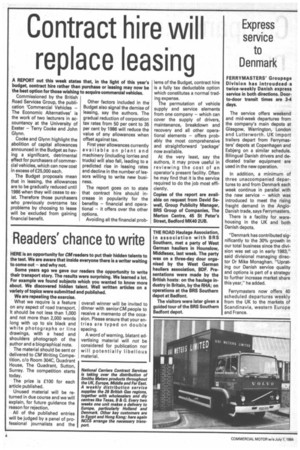Contract hire will replace leasing
Page 6

If you've noticed an error in this article please click here to report it so we can fix it.
A REPORT out this week states that, in the light of this year's budget, contract hire rather than purchase or leasing may now be the best option for those wishing to acquire commercial vehicles.
Commissioned by the British Road Services Group, the publication 'Commercial Vehicles — The Economic Alternatives' is the work of two lecturers in accountancy at the University of Exeter — Terry Cooke and John Glynn.
Cooke and Glynn highlight the abolition of capital allowances announced in the Budget as having a significant, detrimental effect for purchasers of cornmerdial vehicles, which can now cost in excess of £25,000 each.
The Budget proposals mean that in leasing, the allowances are to be gradually reduced until 1986 when they will cease to exist. Therefore those purchasers who previously overcame tax problems by choosing to lease will be excluded from gaining financial benefit. Other factors included in the Budget also signal the demise of leasing, say the authors. The gradual reduction of corporation tax rates from 50 per cent to 35 per cent by 1986 will reduce the value of any allowances when offset against tax.
First year allowances currently available on plant and machinery (including lorries and trucks) will also fall, leading to a predicted rise in leasing rates and decline in the number of lessors willing to write new business.
The report goes on to state that contract hire should increase in popularity for the benefits — financial and operational — it offers over the other options.
Avoiding all the financial prob lems of the Budget, contract hire is a fully tax deductable option which constitutes a normal trading expense.
The permutation of vehicle supply and service elements from one company — which can cover the supply of drivers, maintenance, breakdown and recovery and all other operational elements — offers probably the most comprehensive and straightforward 'package' now available.
At the very least, say the authors, it may prove useful in reviewing the cost of an operator's present facility. Often he may find that it is the service required to do the job most efficiently.
Copies of the report are available on request from David Sewell, Group Publicity Manager, BRS Group of Companies, The Merton Centre, 45 St Peter's Street, Bedford MK40 2UB.




























































































